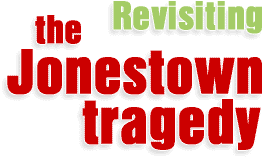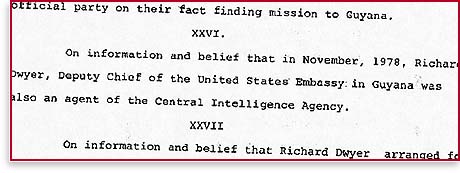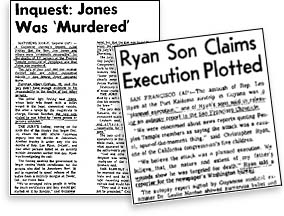
Newly released
documents shed light
on unsolved murders
By Thomas G. Whittle
and Jan Thorpe
Based on years of exhaustive research, that feature documented how one of history’s most gruesome cases of mass murder had been written off as “mass suicide.”
Freedom’s investigation had continued, with significant new information recently unearthed through the Freedom of Information Act and from other sources.
In early 1995, Freedom published “Jonestown: The Big Lie,” an article that examined unanswered questions about the mass deaths in Jonestown, Guyana, in 1978.

hether they liked him or not, most who knew Leo Ryan agreed he had flamboyance, tenacity, nerve and a knack for drawing attention to social abuses. A man who marched to the beat of his own drum, he galled bureaucrats, some of whom, according to a former aide, viewed the Democratic congressman from Northern California as the worst-case-scenario bull in their china shop.
After the riots in Watts in 1965, Ryan, then a California state legislator, traveled to that community under a false identity and became a substitute teacher to investigate conditions in the black community. Five years later, he again went undercover and had himself strip-searched and locked up in Folsom State Prison to discover what life in such a facility was really like. In 1978, he made plans to spend that Christmas season incognito once again, this time as a Postal Service employee to investigate complaints of bad working conditions.
As a congressman, his brassiness caused him to routinely do things which to others were unthinkable, such as “dropping in” at CIA headquarters in Langley, Virginia, to interrogate the spymasters about what they hadn’t been telling Congress.
“He was,” according to a source formerly close to Ryan, and who once accompanied him on a trip to Langley, “a pain in their ass.”

As a member of the House of Representatives’ International Relations Committee and its foremost CIA critic, he was the House sponsor of the Hughes-Ryan Amendment, a 1974 law that required the CIA to notify eight separate committees of Congress—totaling some 200 legislators and staff—prior to conducting undercover operations.
Hughes-Ryan also banned CIA covert paramilitary operations which were not expressly approved by the president and Congress. The agency hated this, a former Ryan associate told Freedom. But the Hughes-Ryan Amendment, which seriously restricted CIA covert operations internationally, was only one index of Leo Ryan’s impact.
In 1975, Ryan leaked word of the CIA’s involvement in the Angolan civil war to CBS newsman Daniel Schorr, creating a wave of major embarrassment for the agency which reverberated for years.
In 1977 and 1978, Ryan pressured the agency to reveal the extent of its involvement in psychiatric “mind-control” experiments. Among the tests he pushed to expose were those performed in the early 1970s on inmates at a state hospital in Vacaville, California, which may have included among their subjects Donald DeFreeze, known as “Cinque,” a central figure in the 1974 kidnapping of Patricia Hearst.
Liabilities
| According to sources, Congressman Ryan routinely did things which to others were unthinkable, such as “dropping in” at CIA headquarters (above) to interrogate spymasters about what they hadn’t been telling Congress. |
By poking into intelligence agency-sponsored psychiatric experiments with DeFreeze and closely related subjects, Ryan stirred up a mixture that threatened to explode with major criminal and civil liability.
On September 25, 1978, less than two months before the Jonestown tragedy, Ryan submitted a petition to then President Jimmy Carter, seeking to have Patricia Hearst’s seven-year prison term commuted to the 18 months she had already served.
In October 1978, a month before Jonestown, investigative reporter Jack Anderson published a syndicated column entitled “CIA May Have Inspired Cinque,” based on information that most likely had been leaked by Ryan or someone in his committee. The column detailed statements from one Clifford Jefferson, who claimed to have known DeFreeze while they were incarcerated together and to have participated in psychiatric experiments with various drugs, including mescaline, Quaalude and Artane.
According to Jefferson, “DeFreeze stated that he had gone through the same tests and also knew of stress tests that were given to prisoners in which they were kept in solitary, harassed and annoyed until they would do anything asked of them to get out; then they were given these drugs and would become like robots.
“He [DeFreeze] said that when he got out, he would get a revolutionary group to kidnap some rich person. They would hold that person tied up in a dark place, keep him frightened and in fear of his life, then give him mescaline and other drugs, and the person would become a robot and do anything he was asked to do—including killing others.
“He thought a good one to kidnap would be one of the Kennedys. Then the revolutionary group would get great publicity and could get the person to get them money.”
Although DeFreeze died in a 1974 shootout with Los Angeles police, CIA documents have since confirmed the agency did perform drug tests on inmates at Vacaville under its MK-Ultra program. These tests aimed at studying what effects drugs and stress had on prisoners to determine at what point individuals would “break” and become willing to follow orders blindly.
As described by Dr. Lawrence T. Clanon, Vacaville superintendent, the CIA appeared interested in “whether drugs could be used in questioning people or gaining their cooperation, or combating that effect.”
Leo Ryan’s spotlight had been trained upon one of the darkest and ugliest corners of the American intelligence establishment, one for which the level of culpability could scarcely be measured—psychiatric “mind-control” experiments, possibly combined with an illegal domestic operation—and one which elevated his status from gadfly to mortal enemy.
“I told him to leave them alone,” a former Ryan associate told Freedom. The congressman was accustomed to busting down doors, he said, a dangerous practice when dealing with an agency experienced in the art of assassination. Ryan, however, pressed ahead.
Documents Released
In March 1997, the Federal Bureau of Investigation announced that it would release for the first time nearly 39,000 additional pages of documents concerning Jonestown, the Peoples Temple and related matters under the Freedom of Information Act. As these documents become available and are examined, new revelations concerning the mass deaths at Jonestown in 1978 and the killing of Congressman Ryan continue to mount. The documents include 8,603 pages from the FBI’s investigative file and an additional 30,229 pages. The bureau made the papers available based on a 1993 FOIA request filed by Freedom.
| At the time of his death, Leo Ryan’s spotlight was trained on one of the darkest corners of the American intelligence establishment—psychiatric “mind-control” experiments, possibly combined with illegal domestic operations. His probe included tests performed at a Vacaville, California, state hospital (above), reportedly involving Donald (known as “Cinque”, top) DeFreeze, a central figure in the 1974 kidnapping of Patricia Hearst. A month before Ryan’s murder, Jack Anderson (right) published a column entitled “CIA May Have Inspired Cinque,” exposing the secret experiments, with Ryan or his committee the most likely source of the information. |
Contrary to what is popularly reported in the media, the FBI files document the Peoples Temple as a mainstream religious congregation, with statements on behalf of the group by a range of political figures including Senators Walter Mondale, Hubert Humphrey, Henry Jackson, Sam Ervin Jr., Warren Magnuson and Mike Gravel, Congressmen Philip Burton, Ron Dellums and Don Edwards, Congresswomen Bella Abzug and Patsy Mink.
The papers demonstrate wide support for the organization. Actress and activist Jane Fonda wrote: “I also recommit myself to your congregation as an active full participant—not only for myself, but because I want my two children to have the experience.”
They also show its leader, Jim Jones, as a respected minister of the Disciples of Christ, the Protestant church of former President Lyndon Johnson and millions of other Americans.
And they show that while the church underwent a long period of harassment, surveillance and infiltration at the hands of government intelligence agents, these intensified once the group, founded in Indiana, relocated to San Francisco, and particularly after its headquarters moved to Guyana.
Indeed, in 1977 and 1978 came anonymous threats against the Peoples Temple, accompanied by random acts of violence against group members. It was in late 1977 that heavy pressure began on Ryan to visit Jonestown—pressure which built to a crescendo shortly before he agreed to go. Those pushing him to take action against “cults” included psychologist Margaret Singer, while others, among them Tim Stoen, a former member and top aide to Jim Jones with alleged ties to the CIA, pressured Ryan to visit Jonestown. (See “The Real Cult,”.)
“Infiltrated with Agents”
|
More than 20 months after Leo Ryan was killed, his five adult children—two sons and three daughters—filed a lawsuit based on extensive investigation into what had precipitated their father’s death.
Filed in the United States District Court for the Northern District of California on July 31, 1980, the suit asked for general damages of $3 million, plus costs for Congressman Ryan’s funeral and bringing the action.
The lawsuit charged that “the Jonestown Colony was infiltrated with agent(s) of the Central Intelligence Agency of the United States.
“[That] the name of one said agent was Phillip Blakey, a trusted aide of Peoples Temple leader James Warren Jones.
“[T]hat said agents were working with the Department of State and the Central Intelligence Agency to use the Jonestown Colony as part of the Central Intelligence Agency’s MK Ultra program.
“[T]hat massive quantities of mind-control drugs were found at the Jonestown colony after the fatal incident of November 18, 1978.”
Phillip Blakey had traveled to Guyana to select the site for Jonestown and to begin clearing land. He was one of the few survivors of the mass killing.
The lawsuit furthermore charged that Richard Dwyer doubled as an agent of the Central Intelligence Agency and that Dwyer “arranged for the transportation of decedent [Ryan] and his party once in Guyana; briefed decedent and his party on the events and conditions at Jonestown upon their arrival; and escorted decedent and his party to Jonestown in November 1978.”
It alleged that Dwyer “as an agent and employee of the Central Intelligence Agency ... negligently, maliciously and intentionally withheld crucial information about the Jonestown Colony which would have prevented harm to decedent.”
It further charged that Dwyer “knowingly, intentionally and maliciously led [Ryan] into a trap at the Port Kaituma Air Strip, which cost decedent his life.”
The Ryans’ lawsuit was dismissed for reasons that have to date never been fully disclosed. A source close to the family who aided them in their quest for justice told Freedom of threats received which he attributed to the CIA. Every time he made a move, he said, a warning would arrive on his doorstep by a circuitous route. “A letter would show up,” for example, he said, stating, “’We’re watching you.’”
Mass Murder
Although many others lost their lives on November 18, 1978, according to Dr. C. Leslie Mootoo, then chief medical examiner of Guyana, the overwhelming majority of the deaths at Jonestown were murders, not suicides.
Dr. Mootoo, the government’s top pathologist and the first physician on the scene, told Freedom that many had died from injections of cyanide. After 32 hours of nonstop work in stifling heat, amid decaying flesh, in Mootoo’s words, “We gave up.” By that time, 187 bodies killed by injections had been examined by Mootoo and his team. Victims had been injected in portions of their bodies they could not have reached themselves, such as between the shoulder blades or in the back of an upper arm. “Those who were injecting them knew what they were doing,” Mootoo said.
Many others had been shot. Charles Huff, a former member of the U.S. Army Special Forces in Panama, was one of the seven Green Berets who were the first American troops on the scene following the massacre. He told Freedom, “We saw many bullet wounds as well as wounds from crossbow bolts.”
Huff noted that those with fatal bullet or bolt wounds appeared to have been running toward the jungle that surrounded Jonestown. Corroborating the information from Dr. Mootoo, Huff said that the adults who had not been shot had been killed by injections between the shoulder blades. The killers escaped before the arrival of Huff and his team.

U.S. Air Force Colonel L. Fletcher Prouty, who worked closely in key positions with the CIA and the Joint Chiefs of Staff for many years, told Freedom that Leo Ryan had moved in too close to certain skeletons that could never be safely disturbed. A relentless and uncompromising investigator, nothing could stop Ryan—short of violence. But how could such a high-profile personality be eliminated without bringing down upon the perpetrators an investigation to end all investigations?
A very real possibility is that by making the assassination part of an even larger catastrophe, the central drama itself—that of a courageous individual blocked from probing reports of illegal, unconstitutional, government-sponsored psychiatric “mind-control” activities—was obscured.
Colonel Prouty noted evidence of the involvement of a larger force in the operation: “The Joint Chiefs of Staff had prepared air shipments of hundreds of body bags. They didn’t normally keep that many in any one place. Within hours, they began to shuttle them down to Georgetown, the main city. They couldn’t possibly have done that without prior knowledge that it was going to happen. It shows that there was prior planning.”
Prouty said, “We would provide the agency with the things they were requesting, without any questions. That’s the way the business works.”
At Jonestown, he said, the JCS provided the body bags, the airlift and all the rest on a timetable that shows advance knowledge. “The JCS wouldn’t have moved at all on their own,” he said. “They didn’t give a damn about Jonestown.” These and other unusual events, he noted, “are the kinds of earmarks that define the hand of American intelligence.”
Nearly two decades after the death of Congressman Leo Ryan, America is still owed a definitive explanation for the many unresolved questions surrounding the tragedy. To begin, all documents and records from all relevant agencies should be released in full. Only then might the full truth be 

| ||
 |
Dr. C. Leslie Mootoo, then Guyana’s chief medical examiner and the first physician on the scene after Congressman Ryan’s death, worked nonstop for 32 hours, examining 187 bodies murdered by injection before he and his team gave up due to the stifling heat. Many others had been shot, Ryan himself reportedly 12 times... |  |

